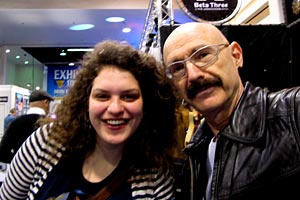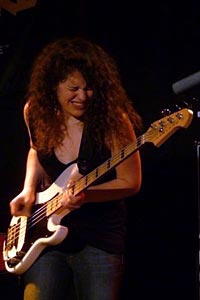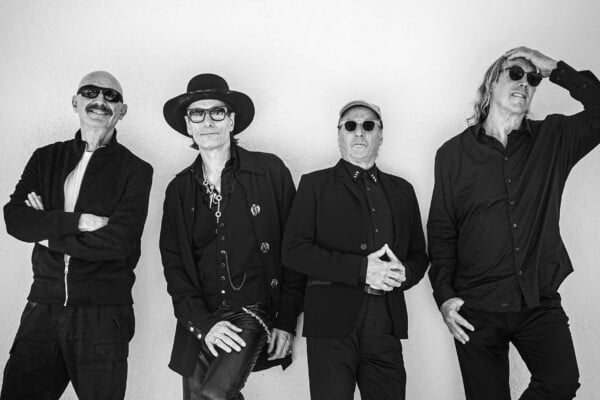Two of a Perfect Pair: An Interview with Tony Levin and Julie Slick
 The “Two of a Perfect Trio” Tour, which brings The Stick Men and Adrian Belew’s Power Trio together for a night of King Crimson-centric music, presents many parallels between the musicians, the most interesting being the dichotomy between bassists Tony Levin and Julie Slick.
The “Two of a Perfect Trio” Tour, which brings The Stick Men and Adrian Belew’s Power Trio together for a night of King Crimson-centric music, presents many parallels between the musicians, the most interesting being the dichotomy between bassists Tony Levin and Julie Slick.
Levin has over 30 years of experience under his belt, much of that being dedicated to the low end of the iconic prog-rock band. Slick, who joined Crimson frontman Belew’s trio in 2006, brings her own fresh energy and to the outfit. Throughout the concert, the two play their own unique takes on the songs, eventually trading parts back and forth during the “Crim-centric” double-trio encore.
The similarities continue with their work ethic as each bassist also released new albums last month. Levin teamed up with David Torn and Alan White to release Levin Torn White while Slick released a duo album with drummer Carl Bahner called Live at Slick Sound Studios.
We caught up with the duo backstage during the tour’s stop at Jammin’ Java in Vienna, Virginia, where we picked their brains about gear, touring and learning from each other.

Tony, how did this tour come about?
Levin: Adrian I think had the idea that it would be good if his Power Trio would combine with the Stickmen. Coincidentally then, with three of us being [King] Crimson members and three other great players, we could do quite an interesting version of some Crimson music, including the 6-man, double trio stuff from the ’90s. So it was Adrian’s idea. He asked me and Pat [Mastelotto] if we were interested in it, and we certainly were. We jumped on that baby.
Is there one song you always look forward to playing?
Levin: I would say no, and it varies from tour to tour. I mean, it’d be nice to “Sledgehammer” on this tour [laughs]. Generally, in my experience, each tour either has a settled set like Peter Gabriel, where once you find the right set, it stays the same. And then if [the tour] goes on long enough, I do find that there are some I look forward to more than others. A more interesting way to do a long tour, especially this long, is to vary the set. We always did that with King Crimson, and we’ll do that plenty on this tour. That way, there’s always that sense of urgency and a little worry about if you’re going to get the new piece right, and that takes away from you being complacent about any songs, which is what leads – for me – to looking forward to the other songs. So it varies quite a bit. It depends on the tour.
But you’re not just getting tired of playing the same songs over and over again?
Levin: No! I think anybody would get sick of playing the same songs over and over again would be a jazz player, because in rock and in pop and in classical, you do play the same songs. That’s what you do, and if you didn’t want to, you would find some other genre of music or completely improv is nice too. I like doing those, but if the song is good, I like playing it all the time and I don’t ever play exactly the same, but almost the same – adding a little bit of how you feel that night. In most bands I tour with there’s some room for improv, or indeed a complete piece that’s improv every night. It’s a very common thing with Stickmen and King Crimson.
Slick: Yeah, I was going to say the same thing. Especially if you have a tour where the set list doesn’t change, but there are pieces that have improvised sections or are total improvs, you tend to look forward to those more. Those tend to be the ones you look forward to more, like “Oh, goodie! We get to play something different here.” And it’s always interesting to see how those improves change. For example, for our trio, a song like “Beatbox Guitar” or “Madness.” It’s always interesting to see how they can kind of morph every night.

So it’s a whole lot of interplay.
Slick: Yeah, and every night it’s different. So it’s fun.
What kind of gear are you guys using?
Levin: I’m using an Ampeg bass amp. This particular leg of this tour I’m using a very small practice bass amp, which is loud enough for what I need. I have quite a few Ampegs and they’re all different. I won’t be bringing the big SVT on this tour simply because we’re traveling in a van and we’re loading our own gear. That’s my favorite amp, but it’s too heavy. Thus far on the tour I’m using a Blackheart guitar amp on the top of the [Chapman] Stick. The top of the Stick goes to a guitar amp. Really I’m using one huge, Blackheart stack with the ultra fifteen watt setting, as opposed to the five watt setting. [laughs] Of course I’m joking, it’s a very small stack.
Other gear… Lots of pedals. My favorite compressor right now is the Analog Man Comprossor. I use that on the Stick and sometimes on the bass. The other pedals vary from piece to piece.
Slick: I’m using a Lakland Bob Glaub Precision Bass into a Keeley four-knob compressor, which if I only have to bring one pedal, that’s the one I need. It’s my favorite, though I’d be interested in trying Tony’s favorite. It gives the bass that extra sustain. Also I have a Z-Vex Wooly Mammoth for distortion and an Eventide Pitch Factor, which is a pedal I’ve had for about a year. It’s just a really fun pedal because it harmonizes things and has two separate delays. I was able to replace a big multi-effects unit that I used to use into this one little tiny little stompbox. This tour is all about downsizing [laughs]. You gotta fit the two drum sets on stage, so you gotta downsize. And I think the Eventide sounds a lot better sonically, too. That all goes into a GK MB Fusion head, which is again a nice, small head. It’s got tubes so it’s got that tube saturation that I really like. And that goes into a NEO 212 cabinet.
Levin: We said gear and I started with the amp and went back to the pedal, and I forgot the instruments. I’m playing a Chapman Stick – a 12-string version. For a lot of the pieces I bring out the bass, which is a Music Man 5-string StingRay.
So are you guys gearheads yourselves, or do you just use what gets you by?
Slick: Sometimes you know, you just come across pedals that are interesting and you think “I have to have that.” For example, when we were in Russia, we tried out this distortion pedal called the Fatal Tube, which is actually like a death metal guitar pedal. It’s not meant for bass per se, but because it’s a death metal pedal it’s got that lower range. Tony actually bought one first and brought it to soundcheck and let me use it for soundcheck. After that, I ran right back to the store and got one for myself. I was using that for a while until I met Zach Vex at the NAMM show. I tried out the Wooly Mammoth, and that was one of those moments where it was like, “Oooh, that’s even better.” So sometimes you just come across stuff or you just hear about things and you try that.
Levin: For me, the effects depend on which kind of tour it is. This is a tour by van, so I can carry some of my bigger pedals. For instance, my favorite fuzz tone then was the Fatal Tube. In fact I had two, until they both broke.
Slick: That’s the fine West Siberian manufacturing [laughs].
Levin: In the middle, I actually found the Pigtronix fuzz, which I actually prefer, but it’s bigger and it’s got its own power supply. Those two factors are huge when you travel, if you’re going to fly. If there were any flights on this tour I would take something small but is close to what I want. [Since there are no flights], I have the luxury of bringing the pedals I actually like, so I bring the Pigtronix out. Unfortunately, baggage size and weight is a big issue for us when we travel.
Julie, you use the VB-99 a lot in your music. How did you get into that?
Levin: Well, Adrian has a VG-99 and he would use it a lot on the road. I thought it was really interesting how it could model other guitars. He uses it sometimes on solos and things. I guess I saw the press release for the VB-99 and thought, “This is something I have to have because it would be so cool to be able to play guitar on bass.” Growing up, my dad had this amazing vintage guitar collection. Like, thirty amazing vintage Fender Telecasters, and Les Paul’s and things like that. He had one bass, and that was a fretless Gibson Ripper. That was the instrument for me. I tried playing guitar, but bass just feels right to me. It’s really opened up a whole new world for me to be able to play these instruments, especially keyboard. I’m a terrible keyboard player, but I get to plug into the VB-99 and play an organ solo, just like Adrian gets to play a piano solo. It’s just all about getting influenced by Adrian. My pedal collection started growing, the gear started growing. I’m not using the VB-99 on this tour though, just because there’s enough going on, I think. I don’t need the extra 15 minutes it takes to set it up and take it down every day, and the space and everything like that. I definitely use it a lot for solo shows and duo shows and local gigs. If we do Power Trio touring in Europe or just Power Trio touring where we have longer sets, I definitely bring it because it’s just fun to have another toy on improvised pieces like “Beatbox Guitar.”
Bryan Beller brought up this point when we interviewed him, too… the cost of tours now is enormous, and getting a decent return seems to be getting tougher. Is this a sign that large tours for this kind of music are falling to the wayside, or is it just the times?
Levin: I think there’s a lot to that subject, and none of us can explain all the aspects of it. In general and in my experience: yes, the economy affects rock clubs and those of us, how shall I put it, closer to the bottom of the pond than to the top of the pond. For those of us selling 100 or 200 seats a night in a rock club, it’s becoming increasingly difficult to book much of a tour because the rock clubs really want to be completely full. Then they’re going to have to bring in other things, and also they can afford to give you less of an advance or guarantee. Meanwhile your expenses – hotels and vans and gas – have gone up, not down. So in the last five or six years it’s become increasingly harder for my band, or my different bands, to tour in the U.S. In Europe it’s not the same and in South America it’s not the same, but U.S. tours are getting to be harder. I wouldn’t say there’s a direct correlation, but that could be part of why we’re now combining two trios that each have a decent draw with the hopes that the two of them will sell out every night. That just kind of makes the whole thing work for the club owners, the bands and for the fans. I think there are some people who have better answers and more complete pictures of the whole scene, but typical of me I only know the bits that I’m doing, and if I’m touring with Peter Gabriel there’s no problems with sales. The acts that play stadiums and arenas are doing fine, I think. It’s for those of us somewhere around the middle. And I would guess, though I’m not in them, the beginning bands that really could have done a little tour for not much money are having a lot of trouble getting any money to do any kind of tour.
Slick: I don’t know if that’s true about the stadium bands, though. I think they’re suffering, too. Just reading the Bob Lefsetz letter and stuff. He talks a lot about that kind of thing. So I think the economy is really affecting it all. And that’s also due to completely inflated ticket prices. People aren’t going to pay two hundred dollars to see a show at a stadium that sounds horrible. Otherwise what Tony said is exactly what I would have said.
Tony, you’ve played with so many people, and a lot of the readers want to know… is there going to be any more from the Liquid Tension Experiment?
Levin: That’s a good question. Not only do I never know what’s coming next, but let me add to that that the few times I say in an interview, “here’s what’s happening,” I find out six months later when people read it that I was dead wrong. So I’ll just tell you with the caveat of what I think is happening. There are certainly no plans for us to get together. I would certainly like it if we do, and if I had to guess I’d say that some day in the future we will tour again as a band, but really there’s no way to know. Even when all the other three guys were in Dream Theater, they were so busy and were such hard working guys, and I’m pretty busy on my own side, that it was pretty difficult to find a one-week U.S. tour to do. But we managed to do it. Now that Mike [Portnoy] is off doing different things than Dream Theater, it makes the scheduling that much harder. Plus, I just don’t know when it’s even going to be brought up and discussed. So the answer as usual is “I don’t really know, and I hope so.” I can in advance give you the same answer for the King Crimson world tour, same answer… When will Peter Gabriel use the band instead of orchestra, same answer. I hope soon, but I don’t really know. Now watch, all three will call me and schedule the same one-week tour.
Slick: Of course, that’s usually how it works, isn’t it?
Julie, as part of the Adrian Belew Power Trio, you’re playing a lot of King Crimson tunes, and you’re touring with Tony, the guy who played the originals. How has that been? What have you learned and how is it for each of you?
Slick: Well, I just found out I was playing a wrong part in “Discipline” today [laughs].
Levin: Brutal, backstage. It’s brutal!
Slick: [laughs] I’m not as nervous. I think the first time I ever played in front of Tony, I was nervous. Well, I guess technically the first time was at the School of Rock in Downingtown, but I don’t think I really played any Crimson tunes. When we did the festival in Quebec City, we did a whole Power Trio set and I just remember thinking, “Oh, Tony’s watching… I hope I’m doing OK!” I was all stressed. I guess just having now known him for a few years, and we’ve hung out and talked food and share similar interests, the barrier has come down. And the same with Adrian, you know, the idol status. Not to say I’m on the same level. But yeah, we’re all comrades here on this tour. It’s really a blast to be able to play with such talented people every night.
Tony, one reader asks, when you’re working with Peter Gabriel, do you write your own bass lines?
Levin: It varies. Through the years I’ve written a lot of the bass lines, but sometimes Peter will have an idea. Let me say, there are three categories. There’s one where I just made up the bass line. Then there’s another where he has an idea that he’s worked out on a synth bass and he plays it for me, and I either play it or I don’t play it, or I make it somehow more of a bass player thing. And then there’s the third category where he says, “No, I actually want you to play that part.” Usually it’s a very good part. Actually, there have been times where he writes a part that I like and just play. And there have been some amusing variations where I’ll vary it, but he’ll put the part he liked on the record. Of course, it’s his record… why shouldn’t he? Then when we go on tour, gradually as he’s not paying attention to me, I’ll revert back to the part I wanted to play [laughs]. I don’t do it blatantly, and I figure if he really minds he’ll hear it and notice and say so. He has from time to time, but generally not.
The biggest example is the piece “Big Time,” where I recorded the entire piece with [drummer] Jerry Marotta playing with his drumsticks on the bass strings and me fingering the left hand. When the record came out, I found Peter’s bass part which he really liked, but my part was used as a very interesting introduction. I had mixed feelings. I wasn’t thrilled that my part was gone from the whole piece, but very thrilled that it was there at the introduction. Of course I did it happily in the introduction and gradually that’s what led to the invention of the Funk Fingers, so I could play that live on the road. But when the other part of the piece would come in, I would kind of do a combination of the synth bass part and the Funk Fingers. Gradually, and I’ll admit to not being the most collaborative guy, I would veer towards doing the whole piece on the Funk Fingers. Peter would want the whole piece on the synth bass, where I had a sample of his synth bass sound. And there you go, we would kind of negotiate on the road as the tour went on. Fortunately he writes good bass parts. If he wrote bass parts that don’t feel right at all, it would be really difficult.
How about for the Power Trio? Do you write the lines?
Slick: There’s definitely room for improvising. But obviously songs like “Young Lions” or the theme in “E.” That’s obviously a part I play with Adrian in unison. But the sections that come after that, which I guess you could call the verses of that song, he basically plays the line and says “Play whatever you want.” So it was really fun to be able to come up with bass lines for stuff for Adrian. Also, sometimes I’ll play a Crimson tune like “Three of a Perfect Pair,” and I’ll try to put my own twist on it, just because it’s the Power Trio playing it and trying to make it different, not just trying to emulate King Crimson perfectly, because we’re not King Crimson. We’re the Adrian Belew Power Trio.
Do you feel like you get stuck into that mold and you have to prove yourself out of it?
Slick: Well, when I joined the band I was only 20, and I did kind of feel stuck in the mold. I was very nervous and shy on stage, and I was still getting used to playing with Adrian. But I think over the years as we’ve become more comfortable with each other, it’s just gotten fun. I think we all respect each other musically, so it becomes easier to come up with my own parts and put my own spin on things.
Levin: I think that it’s fascinating that Julie has so much to say. All the guys like me who have been doing it a long time, you can almost predict what I’m going to say. But when I hear you interview her about what it’s like for her to come into a situation like this, I find it very interesting and productive for even me to hear, let alone someone who would want to get into this situation. Julie has travelled and is traveling a road that’s of a lot of interest to bass players who are starting out and endeavoring to get into being in a band like King Crimson.
Slick: I’m very lucky [laughs].
It has to be more than luck, right?
Levin: Yeah, it does. I assure you it does.
The “2 of a Perfect Trio” Tour is happening now, running through October 29th.
Editor’s note: Special thanks to our Facebook friends Paul Hopkins, Med Salama, Hyalmari Kansikas Basualto, Corey Matthews and Rick Martinez, who contributed questions for this interview.



